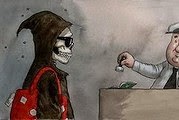Abu Hamza al-Masri, an imam at the
Finsbury Park mosque in north London, was convicted on 11 counts of terrorism
and taking 16 hostages in Yemen in 1998. He left three Britons and an Australian dead.
He was also found guilty
of advocating violent jihad in Afghanistan and conspiring to establish a jihad
training camp in Oregon, U.S. He lost his hands and an eye experimenting with
explosives.
He is just one of a procession
of Islamic clerics Abbott wants to join his “Team Australia”. Is it naivete or
stupidity that would drive a man to ask for Islamic inclusiveness in the fight
against terrorism? It would have made more sense to ask Hitler to help with the
holocaust.
To suggest the fight against terrorism has naught to do with Islam displays
a madness beyond comprehension and a weakness the Islamic terrorist giggles at.
Until Abbott accepts that the Islamic State, and every other terrorist
organisation hell-bent on destroying the West, is borne of Islam, and only
Islam, then Australia can look forward to suffering the atrocities this vile
cult is determined to wreak on us.
Mowing weeds only makes them stronger. To prevent them overtaking your
garden they need to be rooted out. And the root of Islamic terrorism lies deep
in our protected mushrooming mosques housing the imams, mullahs and clerics who
remain free to preach our destruction and further radicalise Islam’s youth.
Islamic inclusiveness has no role to
play in this war.
Every evil organisation on earth has its most vociferous proponent at
its head. Every religious cult has its most dedicated firebrand preacher at the
vanguard. From the Flat Earth Society to the KKK, and every cult in between,
the leaders are invariably the most dedicated nutters exhorting to less
dedicated prospective nutters.
The worst of hundreds of all of the firebrand Islamic radicals in
Australia was the Grand Mufti, Ibrahim Abu Mohammad, but our wise Labor Party
decided to placate him rather than deport him. Islam’s Grand Mufti is entrusted
with interpreting Sharia law yet our leaders are asking the serpent to excise
its own tail.
Tony Abbott and ASIO’s David Irvine court the leaders of Islam begging
their co-operation to deter radical Islam. WTF? The leaders ARE the radicals
you galahs, are you seriously looking to reform them?
Every organisation, including Christianity, is duty bound to enlist new
members to gain strength with obligatory enticements. Christianity has its
heaven, Islam its 72 virgins and both have their hell fires. I haven’t figured
out yet what those female suicide bombers get 72 of.
If Abbott wants to combat radical Islam he should look at the internal
structure of his own church.
Should he seriously have asked his bishops and priests to help quell
the excesses of Christianity? Was it the priests and bishops themselves who
opted to combat paedophilia? No, they were brought kicking and screaming before
Royal Commissions by the rank and file. It was the foot soldiers who led the
charge, the generals were quite happy to continue with their vile practices
into the next millennium.
The worst of Islam can be found in the alcoves of protected mosques
where groups of youths, instructed by mullahs, can be found each Friday
planning the demise of their hosts.
Did these youths decide all by themselves to riot on our streets
brandishing “Behead all non-believers” placards? Of course not! Youths aren’t
born bad, their elders made them bad. And until our leaders understand the root
cause of radical Islam, and deal with it from the top down, we are bound to fall
prey to it.
It’s little wonder Abbott’s olive branch was pissed on.
Pickering Post






